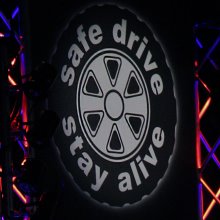
This morning, Shiplake College’s Year 12 Pupils travelled to Oxford to attend Safe Drive, Stay Alive.
On the morning on Thursday 30 November, the lower year of Shiplake’s Sixth Form were taken by coach to The King’s Centre in Oxford. After a 45 minute journey, our pupils were joined by a further 600 young people, none of whom knew what to expect from the morning’s presentations.
After settling into their seats, a silence fell over the audience as the first of eight parts of the eye-opening video they were shown began. It presented, what must be to the pupils, a very relatable situation, seven friends are leaving a pub and they decide what to do next. After debate, they make the decision to go back to a friend’s house, but one has been drinking, so one of the group who has not had anything to drink insists on driving. The video went on to highlight the dangers of distractions and how taking your eye off of the road, for even a second, could be fatal.
The first speaker to talk, Jodie, worked for the emergency services and told a few stories of the horrors she has witnessed. Among these was a story about two young men who had been drinking and decided to drive afterwards. After wrapping his car around the trunk of a tree, the driver was able to walk away from the accident with minor injuries, while the passenger, his best friend, was instantly killed by the branch of the tree the car had crashed into. The message from Jodie was to outline the dangers of driving while under the influence of alcohol; ultimately, it is a selfish and careless act that can easily result in the death of a loved one, or oneself.
Next to speak was Paul Riley of the Fire and Rescue Service. He spoke about his experiences of being among the first to attend the scene of a motoring accident. The point he was making was to always wear a seatbelt. He spoke about the ‘bullseye’, a tell-tale sign that the driver of a crashed car has not been wearing their seatbelt. Afterwards it was the turn of PC Sam Allen of the Thames Valley Police who spoke about speed limits and the use of mobile phones while driving.
Lilly, a nurse at the John Radcliffe Hospital A&E department spoke to the students about the first things they would do for someone who has been in a car crash. Firstly, the airway must be clear so a tube can be inserted into the patient’s mouth, and down into their throat. Secondly, it’s important that the patient is breathing. If they are not it could be an indication of a chest trauma. Next is to look at the chest; she said that it is not rare to have to separate the ribs to get to the heart. At this point, several pupils winced and shuddered at the thought. Finally, in the most severe cases in which the patient may not survive, it is vital to find out if they are an organ donor so that any undamaged organs can be donated to someone else who may need it. It is important to note that counsellors were on hand to speak to anyone who was affected by the morning’s presentations.
The next two speakers were the most moving. The first was the mother of a boy who was killed in a car crash. The pain and heartbreak in her voice was clear, and it is amazingly resilient of her to be able to speak so openly about the tragedy that tore her family apart. The second was a girl who had been in a car crash because she overtook a vehicle, lost control and crashed into a brick wall at 70mph. She needed assistance getting on the stage and after the accident, couldn’t walk for two months. She spent three years in hospital as she had suffered a serious brain injury and didn’t recognise her family for a long time.
Finally, a testimony from an anonymous figure who was interviewed in prison. He had only held his driving licence for two weeks before being put in prison for the crime of death by dangerous driving. Three friends were in the car when he crashed; he killed his three friends and will spend 8 years in prison for it. When he is released from prison, he will have a driving ban for a further 10 years.
The Year 12 pupils were clearly moved, as the mood on the return journey was much quieter, much more sobered and reflective. On behalf of the College, we would like to thank the brave people who spoke to our boys today, thank you for what you do and for speaking about it so candidly.





















